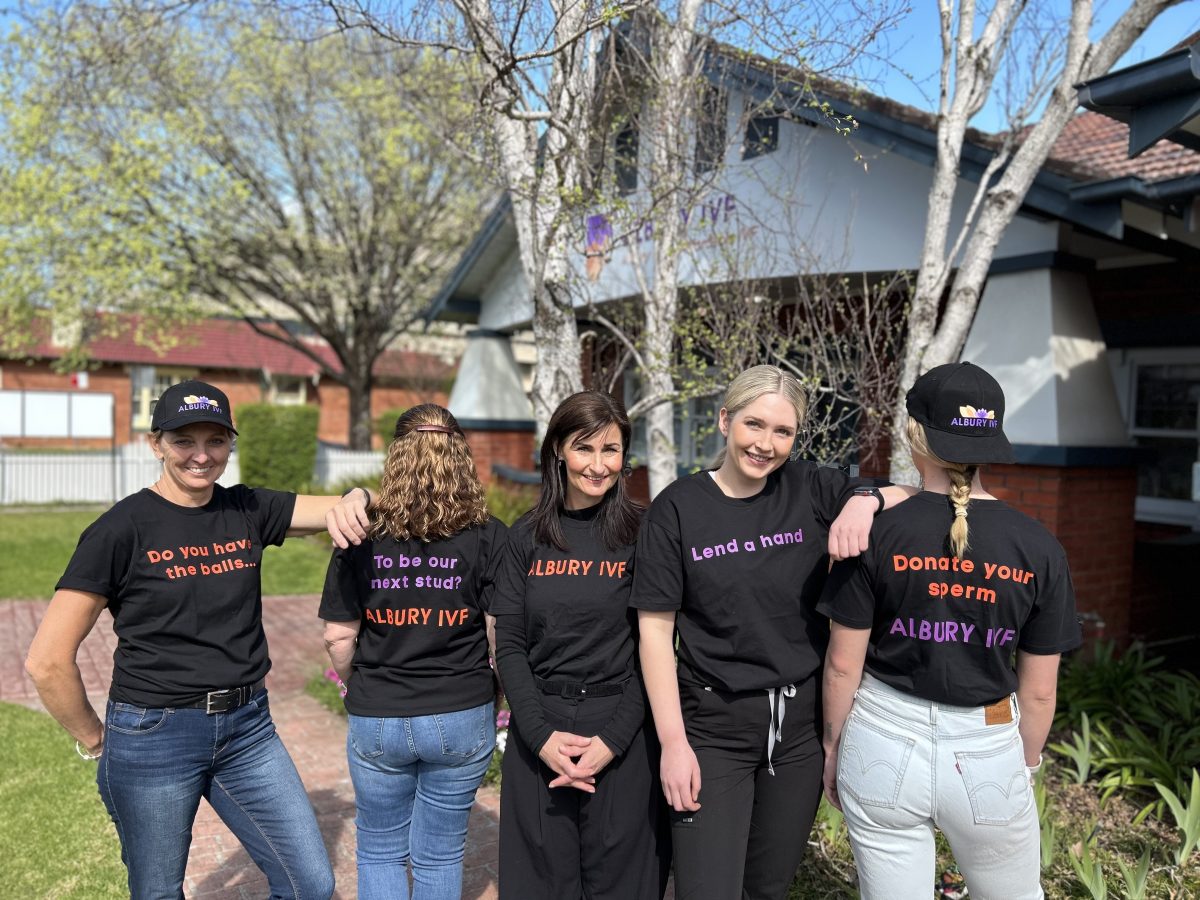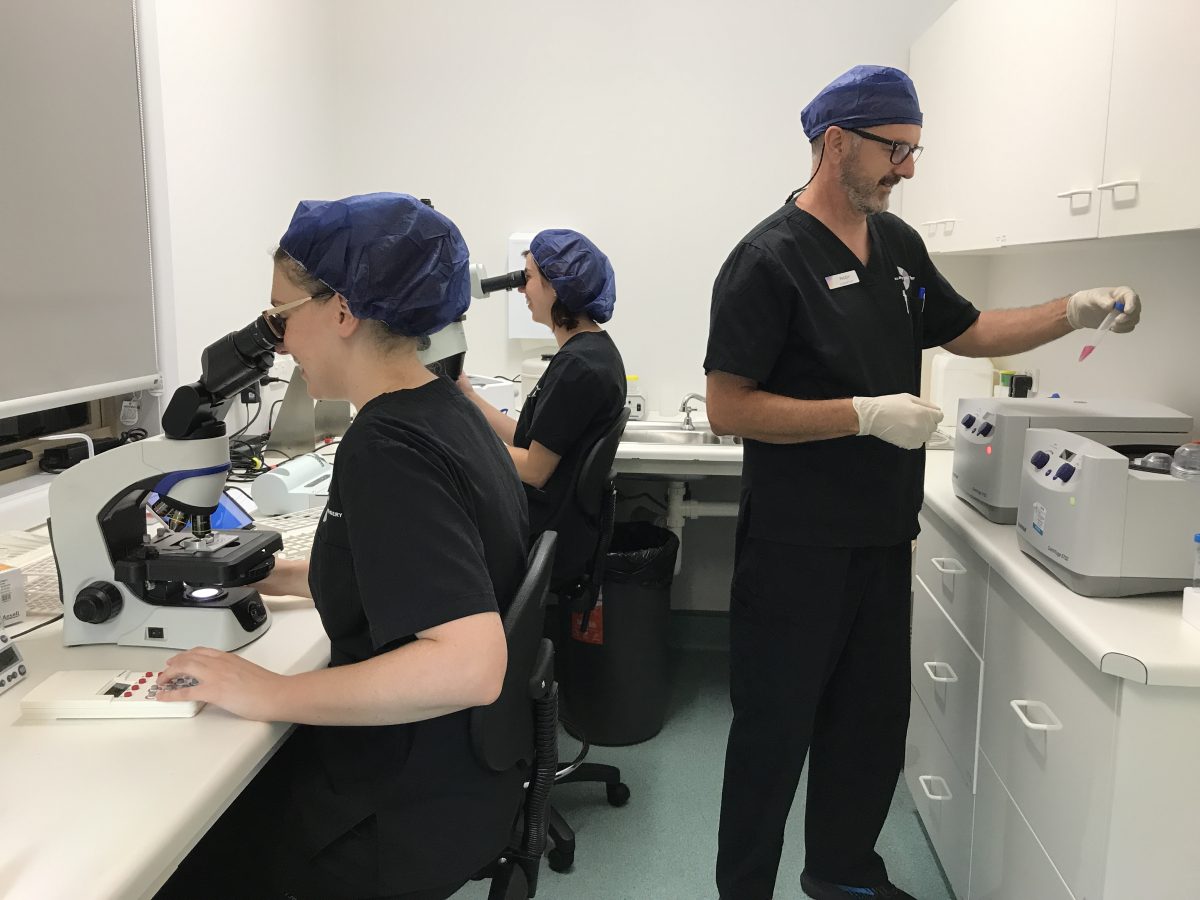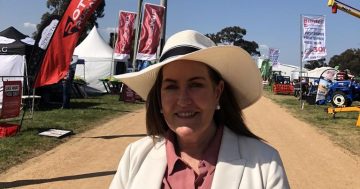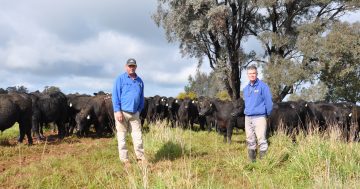
At this week’s Henty Field Days, the nursing team at Albury IVF is hoping farmers can ”lend a hand” to its sperm donor program. Photo: Albury IVF.
Willing farmers will be quizzed about whether they “have the balls” to be the “next stud” for Albury IVF’s sperm donor program at the Henty Machinery Field Days this week.
For the first time, Albury IVF will be exhibiting at Henty, seeking expressions of interest for its donor program as well as sharing knowledge and information on the fertility services the business offers.
In a bid to lighten up what is a heavy topic, staff members will be sporting various T-shirts with cheeky slogans to capture the interest of men who might be interested in “planting a seed for new beginnings”.
“Our donor program is just one part of what we do but we thought the field days would be an ideal event to publicise it and see if we can harvest some potential, one donation at a time,” nurse manager Kate Gordon said.
“As some of our promotional posters will highlight, there is the power of new life in every drop and being a part of this program is about being able to give the gift of life.”
Albury IVF is led by Dr Scott Giltrap, one of the country’s most pre-eminent specialists in fertility and a practising gynaecologist of 38 years.
He said the need for fertility services was increasing due to the rising incidence of infertility in men and women.
Lifestyle, diet and choosing at what age you decide to start trying for a family are some of the main influences.
“Back in the 1970s, the average age of starting a family was 23. Now, it is very common not to consider starting to have a family until you are over 30,” Dr Giltrap said.
“As you get older, it takes longer to get pregnant and that’s related to the age of your eggs.
“Add to that other conditions that happen to you as you get older and your chances of a spontaneous pregnancy in a relationship decrease.”
He said couples delaying parenthood while they sorted out their careers and house finances “and everything else” were suddenly finding that pregnancy was not as straightforward as they thought.
“We see a lot of people whose infertility is age-related; these days we are seeing people presenting for help with their first baby when they’re 38 or 40,” he said.

The Albury IVF team hard at word. Photo: Albury IVF.
Dr Giltrap has seen many changes in his nearly four-decade career and one that is on an upward trajectory is infertility among overweight women.
“The normal level of body mass index (BMI) is under 30; however, we are now seeing large numbers of women with a BMI between 30 and 40 and a significant number between 40 and 50,” he said.
“The issue of diet and weight has been highlighted in the media Australia-wide. However, the impact on a woman’s fertility is still understated. Not only does obesity impact her chance of getting pregnant, but it also increases the risk of complications and the chance of miscarriage in pregnancy.”
Another big issue affecting fertility is a reduction in male sperm count.
Dr Giltrap says phellates (micro-plastics) in common products and insecticides are part of the problem, with epidemiology suggesting they have contributed to a 50 per cent decline in male sperm count and function in the past 50 years.
“Unfortunately, we are wedded to plastics and despite switching to cloth bags to get food from the supermarket to home, just about everything we buy these days is wrapped up in plastic, from our meat to our fruit and vegetables and a huge range of other products,” he said.
As a result, the fertility business is in demand. Dr Giltrap opened his own clinic in January 2021 and his team has grown to four gynaecologists, eight nurses and four scientists.
“We’ve got a population that has decreased fertility, and this is not just Australia, this is worldwide,” he said.
“There are some lessons here – one is weight, and two is to reverse the trend and start having children earlier, as then you may not need to access a fertility service.
“It’s also a bit cheaper and more fun to get pregnant naturally and you can do it every month, whereas with IVF you don’t do it every month and it costs a lot of money.”
Dr Giltrap said Albury IVF’s sperm donor program assisted in various scenarios.
“There are some men that just cannot produce sperm, therefore couples can access the donor sperm,” he said.
“Then there are women who are single and don’t have a partner of any sort – this is a regular treatment we offer which has become much more common since COVID.
“There are also women who are in female relationships, and this has become an increasing area of fertility management. We used to see it occasionally over the previous decade but it’s now very common.”
Dr Giltrap said it was important to have good services in rural areas so regional people could have the same opportunities and medical treatment as people in capital cities.
“If they don’t have good facilities locally, they have to access metropolitan areas, and it’s not a one-off visit, it’s numerous visits, numerous investigations, and the travel and the time off work makes that inaccessible for a lot of people,” he said.
“Many people will get pregnant with good diagnosis and fertility management and therefore will not require IVF.”
You can learn more about Albury IVF here.







